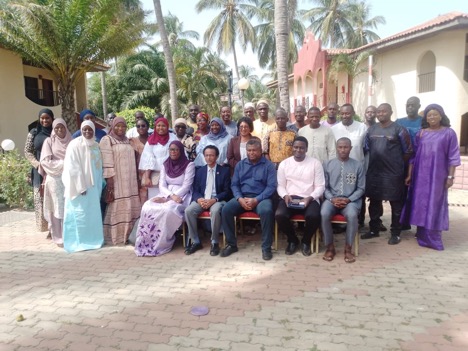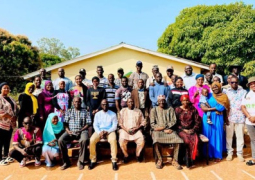
The journey to this two-day validation held at the Ocean Bay Hotel, started eight months ago, and was borne out of the necessity for a broader and pragmatic approach to help in the containment of cancer, which continues to pose a health burden to many countries including The Gambia.
Welcoming the gathering, Dr. Kebba Bojang, head of National Cancer Control Programme in The Gambia, recalled that NCCP was established in September last year, tasked with overseeing cancer prevention and control in the country.
“It came out the realization that cancer, which is the leading cause of death worldwide, is indeed a major health problem in the country too. Incidence and mortality due to caner have been increasing in The Gambia over the years.”
Dr. Bojang revealed that the five main cancers in the general population reported were cervical, liver cancer, breast cancer, lung cancer and prostate cancer, although efforts were being made in the country to ameliorate the cancer problem.
In ensuring that this health problem is contained in the country, it was realised that there was however no comprehensive policy and guideline for cancer prevention and control; there were uncoordinated activities at different health facilities vis-à-vis cancer care as well as insufficient research agenda to guide response to cancer in the country, among a host of others.
Desta Tiruneh, World Health Organisation representative in The Gambia, congratulated the Ministry and the National Cancer Control Programme on achieving yet another milestone as they strive to improve the health of Gambians.
“Our focus today is on cancer, which belongs to the family of Non-Communicable Disease. We know that Non-Communicable Disease (NCDs) including heart disease, stroke, cancer, diabetes and chronic lungs disease, are collectively responsible for 74% of all deaths worldwide. Unfortunately, more than three quarters of all NCD deaths and 86% of the 17 million people who died prematurely or before reaching 70 years of age, occur in low- and middle-income countries.”
WHO country rep described cancer as a leading cause of death worldwide, accounting for nearly 10 million deaths in 2020, saying about one-third of deaths from cancer is tobacco use, high body mass index, alcohol consumption, low fruit and vegetable intake and lack of physical activity.
For his part, Ahmadou Lamin Samateh, minister for Health, described the day as a significant milestone and a move that reflects ‘our collective’ dedication to tackling one of the most formidable challenges facing society- the fight against cancer.
“Cancer, with its insidious reach and devastating impact, has left an indelible mark on the lives of our fellow citizens. It knows no prejudice, affecting individuals across all walks of life, irrespective of age, gender, or socio-economic status. The stories of courage and resilience in the face of this affliction echo through our communities, compelling us to respond with urgency and compassion.”
This, he added, necessitated the need to establish the NCCP in September 2022, saying the development of National Cancer Control Strategy is a testament to their commitment in providing accessible, affordable and high-quality health care to all Gambians.
“This strategy encompasses a multifaceted approach, addressing prevention, early detection, diagnosis, treatment and palliative care. It is grounded in evidence-based practice and guided by the principle of equity and inclusivity. Our goal is to leave no one behind, ensuring that every Gambian, regardless of their background, has the opportunity to live a healthy life free from the shadow of cancer.”





